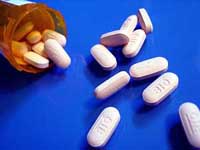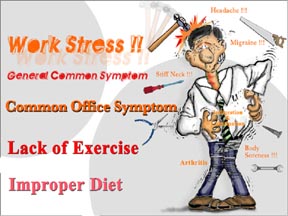|
Unhealthy Lifestyle And Taking Good Health For Granted
An unhealthy lifestyle means more illness and more expense to treat those illnesses. This means a bigger burden on an already challenged healthcare system. Poor health also means more time lost at work, less quality recreational time, and even shorter lifespan. But the people in this modern day have a mindset that takes good health for granted. One can suffer from years of aches and pains, and would just ignore them, and then feel so surprised when one finds out one has developed a serious chronic disease. Majorities would usually leave their health to the hand of the doctors, relying on the advance medical technology, medical drugs when the fall sick. We have the choice to live a healthy lifestyle, but many chose to live just for today, enjoy life, and most of the time end up suffering in pain with chronic diseases and illnesses.
Unhealthy LifestyleThere are many factors contributing to the degeneration of health among many people today. We live in a terribly polluted world. We are all exposed to thousands of toxins and chemicals every day at work, home, in the air, and in the food that we eat and water we drink. In addition, we are eating more processed foods than ever before in human history and we constantly abuse or bodies with pharmaceuticals We are constantly bombarded by fast food at every corner. And video games have led the majority of teens to spend countless hours in front of the television being sedentary. And, as a result of all of this, there exists a generation that is out-of-shape, overweight and obese.
Many would spent hours on a couch in front of the picture box watching their favorite TV programs, together with several packets of snacks like potato chips and other junk food, and they don’t get up from your butt to move around for the next couple of hours, and that’s alright. Too much junk food being put into children's hands. Children were introduced to fast food restaurant at a very young age by their parent, having been brought up in this environment, they grew up spending long hours of their free time there ,chatting with friends, galloping burgers, French fries and cups of Coke, without thinking of how nutritionally deficient foods would intoxicate their body, But do children understand that junk food or snacks like potato chips, burgers and fries have high levels of fat, sugar or salt and are simply unhealthy? Junk food which contains saturated fat increases blood cholesterol levels and therefore increases your risk of heart disease and some cancers.
Is it food or is it toxic waste?
Smoking and drinking are two big habits that can affect your health and the way you feel. Smoking, in particular, is one habit to quit if you haven't already because it greatly increases the risk of heart disease and cancer. Alcohol can be fine in moderation, but when you are with some good buddies in a party, you may drown yourself with glasses of them without realizing how intoxicated your body is, it also can contribute to sleep problems and suppress your appetite, preventing you from eating well. Life is full of stress.
Modern life is full of hassles, deadlines, frustrations, and demands. Work can be a stressful place, whether in an office, a factory, or a school. For many people, stress is so commonplace that it has become a way of life. Stress isn’t always bad. Some stress is good, it can help you perform under pressure and motivate you to do your best. But too much stress is bad, when you’re constantly running in emergency mode, your mind and body pay the price. 
Public are generally dependent on medical drugs and are not aware that medical drug side effects are dangerous to their health. In the world today, Many people seems to think that they just want medicines and drugs to solve their health problems, they believe they can always seek medical assistance,. But what they are not aware of is that these pharmaceutical medications may have potential adverse reactions. Some of the most popular prescription drugs on the market are used for the treatment of various conditions such as high cholesterol to depression to rheumatoid arthritis to sexual enhancement. Some of these pharmaceuticals drugs can cause serious problems such as liver damage, muscle pain and in some cases severe muscle breakdown and even death. When you go to a medical doctor and he gives you many packs of pills and capsules in various colours, shapes and sizes, drugs which are toxic to your liver and do crazy things to your health and metabolism, perhaps you obediently swallow those little poisons without considering what they are doing to your body.
Polluted Environment
Click here to watch video on environmental pollution The industrial revolution, technological advancement and modern transportation have seriously depleted oxygen levels in our atmosphere. Our obsession with carbon-based fuels for power generators, planes and automobiles consumes vast amounts of oxygen daily. Coupled with this is the huge reduction of our forested areas and all plant life as the need for timber and paper continues beyond our production capacity. At the present time, scientists have determined that our atmospheric oxygen concentration levels are being reduced by about 0.8 percent every 15 years or so. Regrettably, at the moment, there is no reason to believe that this trend is going to change. Toxic stress, toxic chemicals and air pollution (all of which are becoming more prevalent in our industrialized cities), as well as increased use of antibiotics, emotional stress (which produces adrenaline and adrenal-related hormones that use more oxygen), physical trauma (reduces circulation and oxygen supply) and infections (the body uses oxygen to fight bacteria, fungi and viruses). Frequent use of drugs also depletes your oxygen supplies at the cellular level. A shortage of oxygen in the blood could very well be the starting point for the loss of the immune system and the beginning point of health problems like cancer, leukemia, AIDS, seizures, nerve deterioration and candida. Future research will clarify the links between poor oxygen levels and disease. Initial symptoms of oxygen deficiency may include overall weakness, fatigue, circulation problems, poor digestion, muscle aches and pains, dizziness, depression, memory loss, irrational behavior, irritability, acid stomach and bronchial complications. When the immune system is compromised by a lack of oxygen, the body is more susceptible to opportunistic bacteria, viral and parasitic infections, colds and the flu. Oxygen deprivation can also trigger life-threatening diseases, as underscored by Nobel Laureate Dr. Otto Warburg’s assertion that cancer and other infections or diseases cannot live in an oxygen-rich environment. Poisonous agents from the household items. Our bodies are absorbing the harmful chemicals surrounding the environment today. It is thus imperative that we clean up our living environment as much as possible. Those regular detergents, soaps, shampoos, toothpastes and perfumes that we uses today contain many chemicals which are toxic to our bodies, some even carcinogenic. Although we don't directly ingest them, these chemicals are absorbed by our skin, other harmful chemicals such as turpentine, arsenic, insecticides, paints, etc. Again, even though we don't ingest them, we are constantly breathing in their gaseous fumes.
Lack of Exercise.You just put in a good 10 hour day in front of your computer screen, and the last thing you want to do is exercise. Let's see, exercise, and improve your fitness level, or sit down with a glass of wine and watch your favorite evening television show. What would you do? Seventy percent of individuals know they should exercise, but choose the wine and the television program instead. Do you know this simple daily decision can end up being detrimental to your health? The simple innocent choice of not exercising has shown, in studies, to promote 10 serious health conditions you don't ever want to develop. The bottom line is physical inactivity has a lot of unhealthy implications even at our bodies cellular level. At the cellular level, inactivity decreases the ability to transfer oxygen from your blood stream to your cells, and also decreases the number of power activating mitochondria. However, the worst cost of not exercising or being physically active can result in the following 10 devastating conditions:1. CANCER - Studies have shown that fitness enthusiastic men and women who are physically active have a 30 to 40 percent lower risk of colon cancer compared to individuals who are inactive. 2. DIABETES - Studies show lack of regular physical exercise increases insulin sensitivity. Diabetes is considered the "sedentary disease" which is striking people at an alarming rate. If it is not controlled, it can destroy the body's organs. 3. HEART - Lack of consistent physical activity, over time, decreases the function of the heart muscle, affects the blood vessels, including the large aortic artery to the veins and small capillaries. According to many studies, scientists have good reason to believe that regular exercise protects the heart. 4. STROKE - Regular exercisers are 25% less likely to have a stroke than their sedentary counterparts. Being fit lowers blood pressure, raises HDL cholesterol, and reduces the risk of blood clots. 5. BRAIN - People who are physically active, according to solid evidence, are at lower risk for cognitive decline and dementia. 6. MUSCLES - If you don't exercise on a regular basis, you are at risk of losing some 6 percent of your muscles mass every decade of life from the age of 30 on. This also translates into a 10 - 15 percent loss of strength per decade. Once again, if you don't use the muscle, you will lose the muscle quickly. 7. OSTEOPOROSIS - Fragile bones cause more than 1.5 million fractures each year in the U.S. Bone is like muscle, if you stress it, it responds. If you don't, you gradually lose its strength, and increase your chances of breaking them. Regular weekly strength training can help prevent osteoporosis, and decrease your chances of breaking a bone. 8. MENTAL HEALTH - People who don't exercise on a regular basis are more prone to develop depression. According to a recent study, people who were more active were nearly 20 percent less likely to be diagnosed with depression over the next five years than less active people. Fitness conscious individuals also generally display an improved self esteem, or self image. 9. WEIGHT - If you are inactive, year in and year out, you will eventually gain weight and lose fitness which increases the chance of a heart attacks, and diabetes. 10. IMMUNE SYSTEM - Moderate amounts of exercise reduces the risk of upper respiratory infection. Regular exercise may boost immune function. Now I would like to ask that same question I asked above. What would you do? Wine and television, or physical activity? Taking good health for grantedNo one wants to be sick, but where does disease really begins?. We start to take notice and some action only after we fall sick, or are in the process of losing your health. During this time, we make all sorts of promises and resolutions. But once we get it back, we often return to our old ways. Good health is one of those things that they take for granted. Chronic, degenerative conditions usually take years, even decades, to develop. For example, if you find a tumor on your body, do you think it grew overnight? No way. It took a long time to get to a size where it becomes visible. And, even before that, the conditions in your body which allow the tumor to grow (e.g. toxic buildup, weakened immune system) had probably been around for years too. Do realize that, once a disease takes root -– cancer being perhaps the most common and most feared one –- the decline usually starts gaining momentum. There will always be many people seeking quick fixes to their medical needs and going long term on medications for their symptomatic control rather than changing their lifestyle. With this health revolution, we are updating everyone with additional health knowledge in order for them to have an opportunity to make the choice of taking personal responsibility for his or her own health. You may decide to make some changes. After reading this webpage, you may want to try making some changes, embracing a lifestyle of better health and wellness,you have to realize that, in health, there isn’t a 100% one-size-fits-all approach. Nobody knows your own body better than you do. You will thus have to customize your own lifestyle to your own unique needs and preferences through a certain degree of experimentation. To do this, you will also have to learn to listen to your body.Creating health is simple, but it sure isn’t easy. In fact, it is sometimes hard work, and it definitely takes perseverance, discipline and determination, since temptations are everywhere. Do realize that, often in adopting a healthcare program, a holistic approach must be taken, and it’s not just about taking one substance or doing one thing to cure a condition or obtain perfect health. Often, you have to do as much as you can. This is simply because the organs and systems in our bodies are very complex. To stay healthy, we needs a total health management program that takes care of the body as a whole and not just partially. From time to time, we need to update ourselves with modern healthcare appoach and also share it to someone else who might need to change their lifestyle for better health. Living a healthy lifestyle will let you have endless health and vitality. Any small positive change you can make is better than no change at all, so don’t give yourself excuses. Remember, Health is the Ultimate Wealth, and being wealthy dosen't necessarily mean healthy.
Without your health, your dreams will never come true. The choices you make today, determine your tomorrows.
|
Singapore Favourite

Char Kway Teow, Fried Oysters, Roti Prata, ... We are advised to ask for less oil and more vegetables, and then expect to be healthier? Do you know that already 52% Singaporeans are overweight according to the revised MOH guidelines and 20% Singaporeans are on the verge of getting diabetes?




